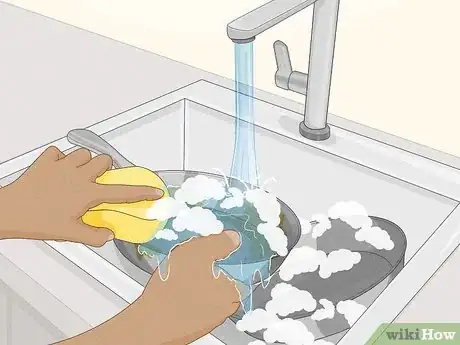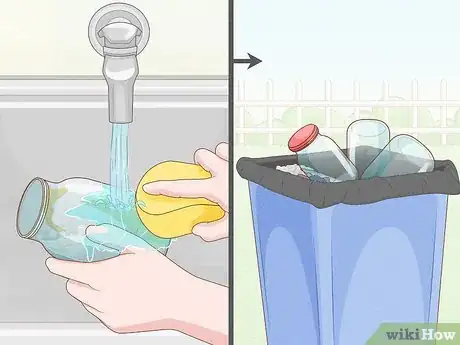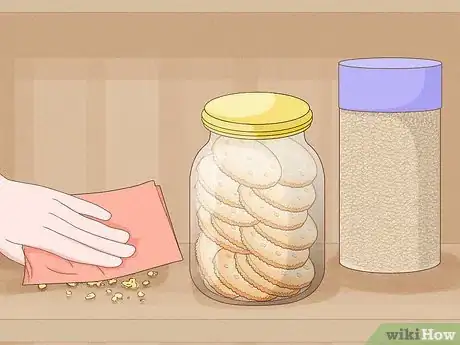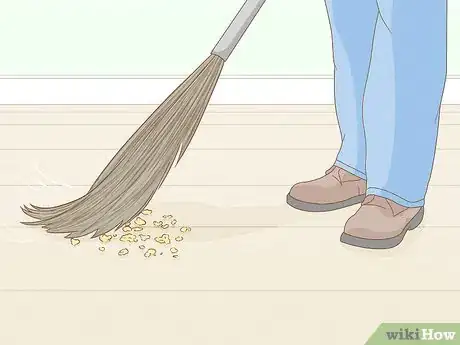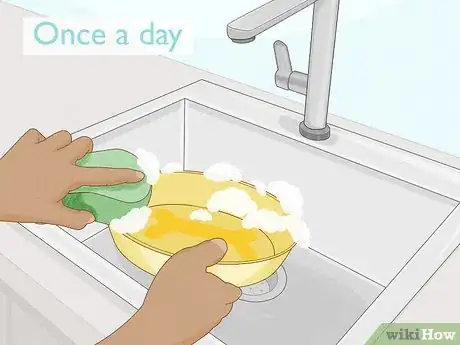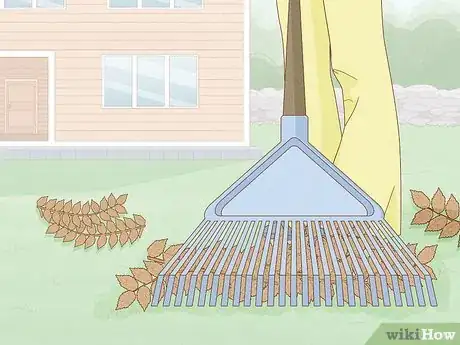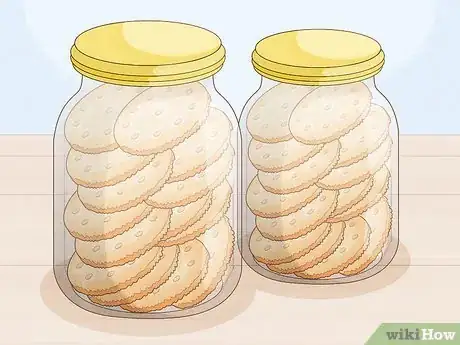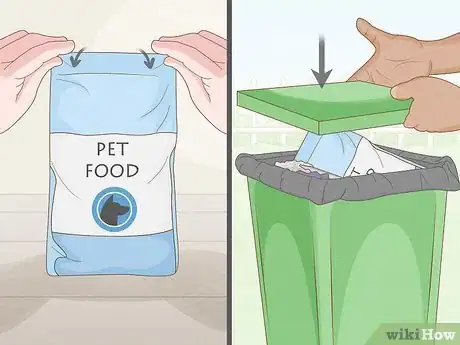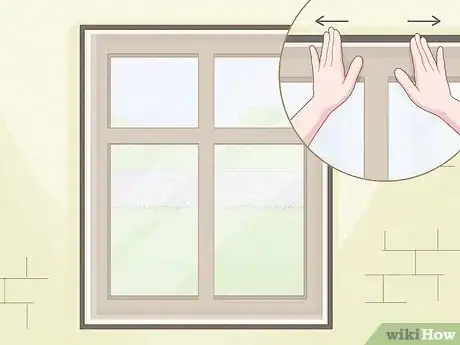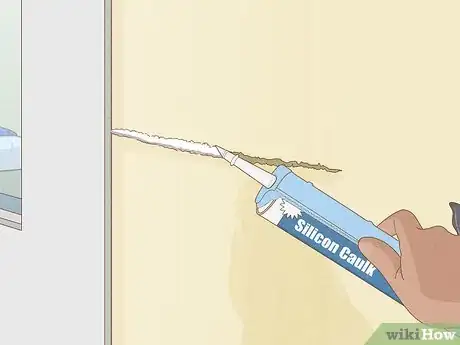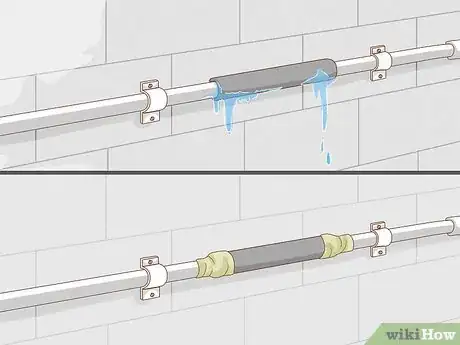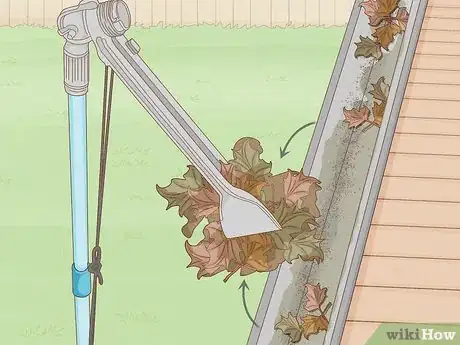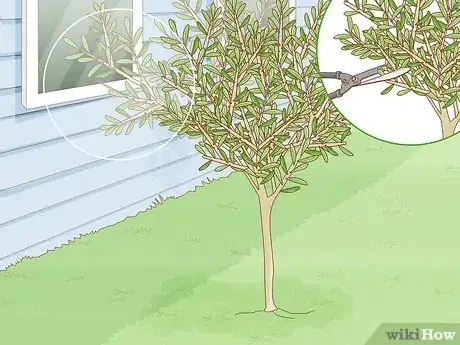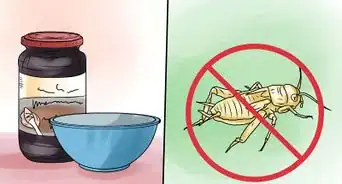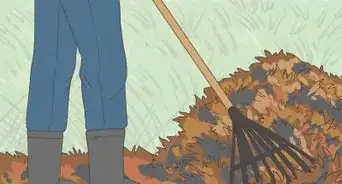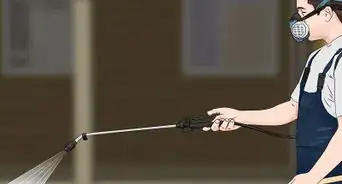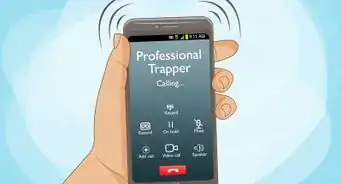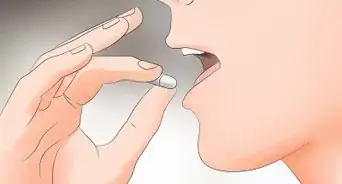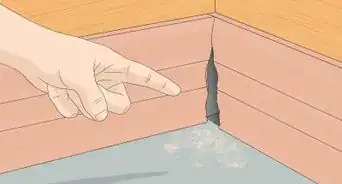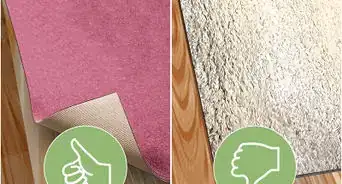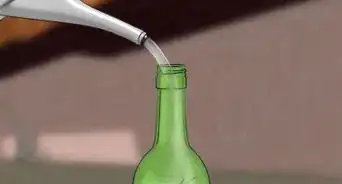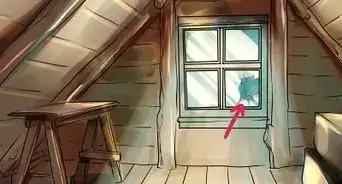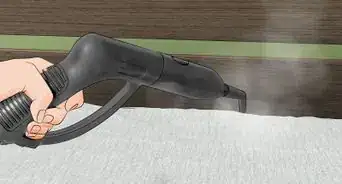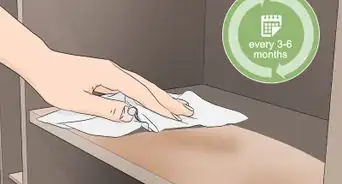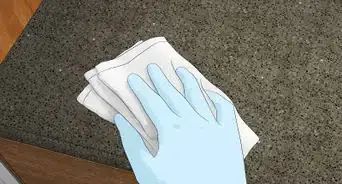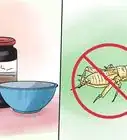This article was co-authored by Kevin Carrillo and by wikiHow staff writer, Hannah Madden. Kevin Carrillo is a Pest Control Specialist and the Senior Project Manager for MMPC, a pest control service and certified Minority-owned Business Enterprise (MBE) based in the New York City area. MMPC is certified by the industry’s leading codes and practices, including the National Pest Management Association (NPMA), QualityPro, GreenPro, and The New York Pest Management Association (NYPMA). MMPC's work has been featured in CNN, NPR, and ABC News.
This article has been viewed 17,524 times.
Keeping your home in good condition is tough work, and pests like insects and rodents can come in and undo all of it in an instant. The best way to remove the threat of pests is to stop them from coming into your home in the first place. By keeping your home clean and storing your food properly, you can deter insects and rodents to keep your home in tip top shape.
Steps
Cleaning Your Home
-
1Clean up right away after meals. The longer you leave food out on your table or countertops, the more likely it is that pests will come and find it. Try to clean up after yourself right away to take away the food source in your home.[1]
- If you don’t have time to fully clean your dishes, you can give them a quick rinse to get rid of most of the food residue.
-
2Take out your trash whenever it gets full.[2] You don’t have to take your trash out every day, but you should try to bring it out to your large garbage can whenever you notice that it’s full. Pests love trash, and they’ll be attracted to the smells inside of your garbage can.[3]
- Taking out your trash regularly also helps to keep your home odor-free.
- Consider using a trash can with a lid to make it harder for pests to get inside.
Advertisement -
3Rinse out your recyclables before recycling them. Jars, cans, and tubs often have food residue left in the bottom that pests can eat. Before you put your items in the recycling, give them a quick rinse to remove most of the food. Then, you can put them in your recycling can outside.[4]
- Rinsing your recyclables will also help eliminate odors.
-
4Wipe crumbs out of your cabinets and off countertops. As you clean your kitchen, use a damp rag to wipe crumbs off of any flat surfaces and into the garbage.[5] Try to avoid swiping them into small crevices, like the gap between the stove and the wall.[6]
- Crumbs are easy pickings for pests, especially when they’re in hard to reach places.
- Make sure you regularly inspect your cabinets for fallen crumbs.
- If there are any food scraps in your drain, clean those out as well.
-
5Sweep up food debris that falls on the floor. It’s easy to wipe crumbs onto the floor and forget about them, but this can lead to more insects and rodents in your home. After you’re done cleaning your kitchen, grab a broom and a dustpan to quickly sweep up any leftover crumbs that might be on the floor. Then, empty the dustpan into the garbage.[7]
- Try to sweep your kitchen at least once a week.
-
6Clean out your pet food bowls once a day. Pet food is a great source of nutrition for insects and rodents, so they’ll often flock to it. Once your pet has eaten, try to make sure there aren’t any crumbs left in the bowl by rinsing it out with water.[8]
- Avoid using an automated feeder that has food in it constantly, as it can attract pests.
-
7Rake up yard debris around your home. Grass clippings, fallen leaves, and branches all make cozy homes for pests to nest in. Grab a rake and make a few piles, then put the debris into your yard debris container, if you have one. If you don’t, try to make piles of yard debris as far away from your home as you can.[9]
- If you use a lawn mower to trim your grass, consider using the bag attachment to easily collect grass clippings as you cut them.
Storing Food Securely
-
1Put your food in cans, jars, or airtight containers. Bugs and rodents can easily chew through plastic and cardboard. If you’re storing food for more than a few days, try to put it in a metal can, a glass jar, or an airtight container with a lid to keep the pests out.[10]
- Try to purchase food items that are already in cans or jars to make this easier.
-
2Seal large bags of pet food in a garbage can with a lid. If you have a big container of cat or dog food, place it inside of a metal garbage can and put a lid on it. You can open it up each time you need to scoop out some food, but make sure you put the lid back on every time.[11]
- Pests love pet food, and they’ll flock to it if it’s left open.
-
3Keep perishable food in the fridge or freezer. It’s super hard for bugs and rodents to get into a refrigerator. Keep as much food as you can in your fridge or freezer for an easy way to seal it and deter pests. Storing your food in the fridge can also make it last longer, so it's a win-win situation. [12]
- Items that could get soggy in the fridge, like crackers or cereal, can stay in your pantry or cabinets.
Pest-Proofing Your Home
-
1Attach screens to your doors and windows. Measure the area of your doors and windows, then purchase some wire screens to pop into place. The screens will help deter insects so you can leave your doors and windows open for fresh air without worrying about bugs.[13]
- Some bugs, like fruit flies, are so small that they can fit through wire screens.
-
2Fill any cracks around your doors or windows with silicone caulk. Take a look at the areas around your windows and your doors. If you notice any gaps or you can see through to the outside, grab a bottle of silicone caulk and squeeze it into the open areas. Let the caulk dry for about 1 hour to fill in the gaps and stop insects from crawling in.[14]
- Sealing the gaps in your doors and windows will also make your home warmer in the winter and cooler in the summer.
-
3Repair any leaky faucets or pipes. If you notice your sink or pipes have a leak in them, contact a professional plumber right away. Leaky pipes and sinks are a great water source for pests, so they’ll gather around any water droplets they can find.[15]
- You can also cover your drains with a rubber drain cover when they’re not in use to deter pets from crawling up through the pipes.
-
4Clean out your gutters once a year. Grab a ladder and lean it against the side of your home. While wearing gloves, gently scoop out the leaf litter and debris in your gutters to keep them clean. Try to do this about once a year in the spring to remove all the clutter from winter.[16]
- Dirty gutters provide warm homes for rodents and insects, and they also disrupt the flow of water down to your drain pipe.
- If you don’t feel confident standing on a ladder or cleaning your gutters, contact a professional to do it for you.
-
5Trim trees and bushes so they aren’t touching your home.[17] If you have any large shrubs that touch the sides of your home, grab a pair of loppers or pruners and trim them until the branches no longer touch your siding. If there are any tree branches touching your home, talk to a professional about cutting them away from your home.[18]
- Trees and shrubs house a lot of pests, and they could be using your home as a second nesting or feeding area.
Expert Q&A
Did you know you can get expert answers for this article?
Unlock expert answers by supporting wikiHow
-
QuestionHow do you get rid of mice?
 Kevin CarrilloKevin Carrillo is a Pest Control Specialist and the Senior Project Manager for MMPC, a pest control service and certified Minority-owned Business Enterprise (MBE) based in the New York City area. MMPC is certified by the industry’s leading codes and practices, including the National Pest Management Association (NPMA), QualityPro, GreenPro, and The New York Pest Management Association (NYPMA). MMPC's work has been featured in CNN, NPR, and ABC News.
Kevin CarrilloKevin Carrillo is a Pest Control Specialist and the Senior Project Manager for MMPC, a pest control service and certified Minority-owned Business Enterprise (MBE) based in the New York City area. MMPC is certified by the industry’s leading codes and practices, including the National Pest Management Association (NPMA), QualityPro, GreenPro, and The New York Pest Management Association (NYPMA). MMPC's work has been featured in CNN, NPR, and ABC News.
MMPC, Pest Control Specialist Nine times out of ten, mice are actually live offsite, not in your home. The average adult mouse has multiple food sites and will probably feed, if given the opportunity, up to 50 times a day at different locations. Most mice are not going to find that many food sources in your home that they can hit on a daily basis. So they go to your home, then your neighbor's home, and so on. Therefore, the best approach is usually to locate all of the structural openings that mice might be able to use to get into your home and then seal them with a permanent material. That way you can go from having mice one day to not having mice the very next day. It's a long-term solution.
Nine times out of ten, mice are actually live offsite, not in your home. The average adult mouse has multiple food sites and will probably feed, if given the opportunity, up to 50 times a day at different locations. Most mice are not going to find that many food sources in your home that they can hit on a daily basis. So they go to your home, then your neighbor's home, and so on. Therefore, the best approach is usually to locate all of the structural openings that mice might be able to use to get into your home and then seal them with a permanent material. That way you can go from having mice one day to not having mice the very next day. It's a long-term solution. -
QuestionHow can I keep possums away from my house?
 Kevin CarrilloKevin Carrillo is a Pest Control Specialist and the Senior Project Manager for MMPC, a pest control service and certified Minority-owned Business Enterprise (MBE) based in the New York City area. MMPC is certified by the industry’s leading codes and practices, including the National Pest Management Association (NPMA), QualityPro, GreenPro, and The New York Pest Management Association (NYPMA). MMPC's work has been featured in CNN, NPR, and ABC News.
Kevin CarrilloKevin Carrillo is a Pest Control Specialist and the Senior Project Manager for MMPC, a pest control service and certified Minority-owned Business Enterprise (MBE) based in the New York City area. MMPC is certified by the industry’s leading codes and practices, including the National Pest Management Association (NPMA), QualityPro, GreenPro, and The New York Pest Management Association (NYPMA). MMPC's work has been featured in CNN, NPR, and ABC News.
MMPC, Pest Control Specialist Most pests are looking for four basic things: food, water, shelter, and an area to raise offspring. If you eliminate those things, the pests should go away. Make sure there's no food in your yard and your trash cans are sealed with a lid. Make sure there's no standing water for possums to drink. Cut back shrubbery and overgrown plants so there are less places for possums to hide. If you have a crawl space under your home, make sure it's fully blocked off so there's nowhere for possums to raise their offspring.
Most pests are looking for four basic things: food, water, shelter, and an area to raise offspring. If you eliminate those things, the pests should go away. Make sure there's no food in your yard and your trash cans are sealed with a lid. Make sure there's no standing water for possums to drink. Cut back shrubbery and overgrown plants so there are less places for possums to hide. If you have a crawl space under your home, make sure it's fully blocked off so there's nowhere for possums to raise their offspring.
Warnings
References
- ↑ Kevin Carrillo. Pest Control Specialist. Expert Interview. 22 October 2019.
- ↑ Kevin Carrillo. Pest Control Specialist. Expert Interview. 22 October 2019.
- ↑ https://www.cdc.gov/nceh/lead/publications/final_companion_piece.pdf
- ↑ https://www.cdc.gov/nceh/lead/publications/final_companion_piece.pdf
- ↑ Kevin Carrillo. Pest Control Specialist. Expert Interview. 22 October 2019.
- ↑ https://www.cdc.gov/nceh/lead/publications/final_companion_piece.pdf
- ↑ https://www1.nyc.gov/assets/doh/downloads/pdf/pest/pest-bro-healthy-home.pdf
- ↑ https://www.tempe.gov/home/showdocument?id=23125
- ↑ https://www.tempe.gov/home/showdocument?id=23125
- ↑ https://www.cdc.gov/nceh/lead/publications/final_companion_piece.pdf
- ↑ https://www1.nyc.gov/assets/doh/downloads/pdf/pest/pest-bro-healthy-home.pdf
- ↑ https://www1.nyc.gov/assets/doh/downloads/pdf/pest/pest-bro-healthy-home.pdf
- ↑ https://www1.nyc.gov/assets/doh/downloads/pdf/pest/pest-bro-healthy-home.pdf
- ↑ https://www.cdc.gov/nceh/lead/publications/final_companion_piece.pdf
- ↑ https://www1.nyc.gov/assets/doh/downloads/pdf/pest/pest-bro-healthy-home.pdf
- ↑ https://www.tempe.gov/home/showdocument?id=23125
- ↑ Kevin Carrillo. Pest Control Specialist. Expert Interview. 22 October 2019.
- ↑ https://www.tempe.gov/home/showdocument?id=23125
- ↑ https://www.cdc.gov/nceh/lead/publications/final_companion_piece.pdf
- ↑ https://www.cdc.gov/nceh/lead/publications/final_companion_piece.pdf
